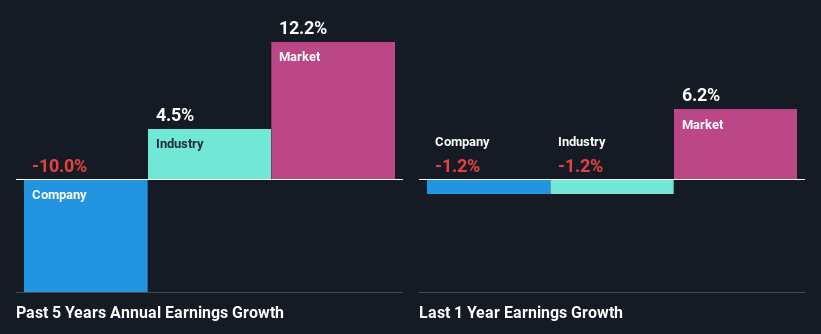Does Abacus Property Group's (ASX:ABP) Weak Fundamentals Mean That The Market Could Correct Its Share Price?
Abacus Property Group's (ASX:ABP) stock is up by a considerable 18% over the past three months. We, however wanted to have a closer look at its key financial indicators as the markets usually pay for long-term fundamentals, and in this case, they don't look very promising. Specifically, we decided to study Abacus Property Group's ROE in this article.
Return on equity or ROE is an important factor to be considered by a shareholder because it tells them how effectively their capital is being reinvested. Simply put, it is used to assess the profitability of a company in relation to its equity capital.
Check out our latest analysis for Abacus Property Group
How Is ROE Calculated?
The formula for return on equity is:
Return on Equity = Net Profit (from continuing operations) ÷ Shareholders' Equity
So, based on the above formula, the ROE for Abacus Property Group is:
5.7% = AU$155m ÷ AU$2.7b (Based on the trailing twelve months to December 2020).
The 'return' is the profit over the last twelve months. Another way to think of that is that for every A$1 worth of equity, the company was able to earn A$0.06 in profit.
What Has ROE Got To Do With Earnings Growth?
We have already established that ROE serves as an efficient profit-generating gauge for a company's future earnings. Depending on how much of these profits the company reinvests or "retains", and how effectively it does so, we are then able to assess a company’s earnings growth potential. Generally speaking, other things being equal, firms with a high return on equity and profit retention, have a higher growth rate than firms that don’t share these attributes.
A Side By Side comparison of Abacus Property Group's Earnings Growth And 5.7% ROE
On the face of it, Abacus Property Group's ROE is not much to talk about. However, given that the company's ROE is similar to the average industry ROE of 6.7%, we may spare it some thought. But Abacus Property Group saw a five year net income decline of 10.0% over the past five years. Bear in mind, the company does have a slightly low ROE. Therefore, the decline in earnings could also be the result of this.
However, when we compared Abacus Property Group's growth with the industry we found that while the company's earnings have been shrinking, the industry has seen an earnings growth of 4.5% in the same period. This is quite worrisome.
The basis for attaching value to a company is, to a great extent, tied to its earnings growth. The investor should try to establish if the expected growth or decline in earnings, whichever the case may be, is priced in. This then helps them determine if the stock is placed for a bright or bleak future. Is ABP fairly valued? This infographic on the company's intrinsic value has everything you need to know.
Is Abacus Property Group Making Efficient Use Of Its Profits?
Abacus Property Group seems to be paying out most of its income as dividends judging by its three-year median payout ratio of 65% (meaning, the company retains only 35% of profits). However, this is typical for REITs as they are often required by law to distribute most of their earnings. So this probably explains the company's shrinking earnings.
Moreover, Abacus Property Group has been paying dividends for at least ten years or more suggesting that management must have perceived that the shareholders prefer dividends over earnings growth. Looking at the current analyst consensus data, we can see that the company's future payout ratio is expected to rise to 92% over the next three years. Regardless, the ROE is not expected to change much for the company despite the higher expected payout ratio.
Summary
In total, we would have a hard think before deciding on any investment action concerning Abacus Property Group. Because the company is not reinvesting much into the business, and given the low ROE, it's not surprising to see the lack or absence of growth in its earnings. Having said that, looking at current analyst estimates, we found that the company's earnings growth rate is expected to see a huge improvement. To know more about the company's future earnings growth forecasts take a look at this free report on analyst forecasts for the company to find out more.
This article by Simply Wall St is general in nature. It does not constitute a recommendation to buy or sell any stock, and does not take account of your objectives, or your financial situation. We aim to bring you long-term focused analysis driven by fundamental data. Note that our analysis may not factor in the latest price-sensitive company announcements or qualitative material. Simply Wall St has no position in any stocks mentioned.
Have feedback on this article? Concerned about the content? Get in touch with us directly. Alternatively, email editorial-team (at) simplywallst.com.

 Yahoo Finance
Yahoo Finance 
